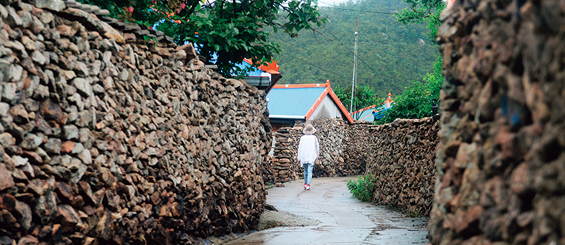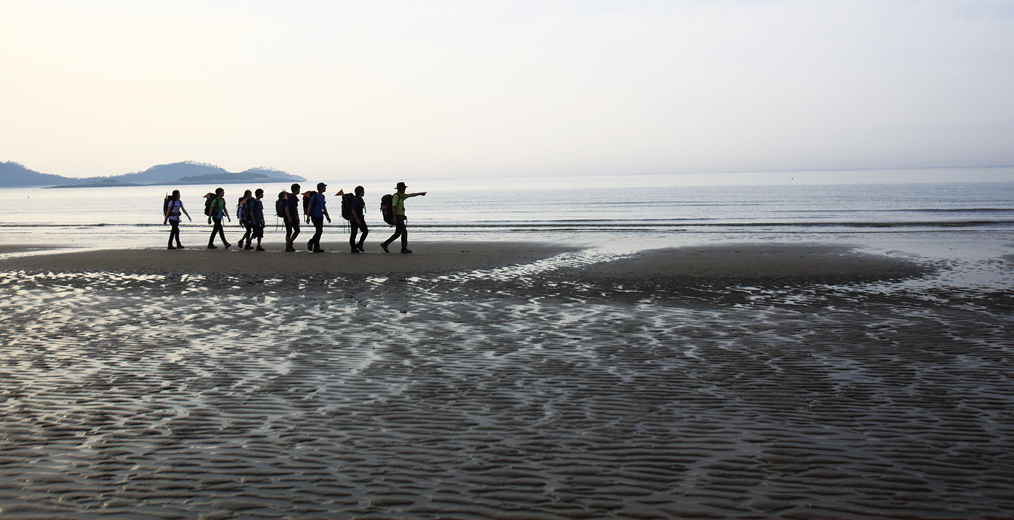I spent seven years of my youth on Bigeumdo. That’s only one-tenth of my life, andthose years are forever engraved in the deepest recesses of my memory. The rich tones of the Bigeum dialect,which I acquired in my childhood, are a part of me and the way I write as a literary critic.
Inland mountains and magnificent coastal scenery envelop the salt fields spread over the coast of Bigeumdo, the first island in Korea where salterns were d.
My hometown is Bigeumdo, an island off the southwestern coast of South Jeolla Province. People call it a remote island, but until I graduated from college, it never occurred to me that the island I grew up on was a faraway place. I thought that title was reserved for islands elsewhere. Far away? Far away from where?
Mountains, White Beaches, and the Language
Actually, I didn’t live that long on the island. At the end of the 19th century when Mokpo became an open port and its modernization began, my family relocated there and lived on the mainland. But when the Korean War broke out in 1950, we took refuge back on Bigeumdo. I was still a young child who had to be carried on someone’s back as we made our way to the island. I lived there until I graduated from elementary school, when we returned to Mokpo.
I spent just seven years of my youth on the island. But those seven years are so deeply entrenched in me that even today, when I’m over 70, those experiences still serve as a yardstick for me to perceive and gauge things in the world. For example, to get a feel for the distance between Seoul and Busan, which is around 400 kilometers, I think of it as being one hundred times the distance between Bigeumdo’s main dock and Jahang, the village where I lived. I judge how high a mountain is by measuring it against the height of Bigeumdo’s Mt. Seonwang; when I come across a big old tree, I compare it to the size of the hackberry in Seosan village. The beautiful scenery of Bigeumdo that I grew up around is the prototype of all scenic landscapes, and the personal possessions of my youth are the prototype of all things. To me, a beautiful white sandy beach means Won-pyeong Beach, and the ocean means the breathtaking view of the open sea from the Dragon Head Rock near Hanuneom Beach.
Then, there is the language of Bigeumdo. The Korean I speak is the dialect of Jeolla Province, and more specifically, that of Bigeumdo, which is distinctive from other dialects of the region. It is somewhat more refined and expressive compared to the sharp and quick-spoken dialect of Mokpo, and not as drawn out as the way people speak in Heuksando, another island in Sinan County. Even if someone speaks the standard Korean you hear in Seoul, I can tell in an instant if they are a native of the island. Once a workman came by our house to install a wardrobe. The moment I heard him speak, my heart skipped a beat. I asked where he was from and he said Sinan. I said I was also from Sinan and asked where specifically in Sinan, to which he said Bigeumdo. It turned out this Mr. Kim had even attended Bigeum Elementary School. Thereafter, we often called on him for jobs around the house.
Proverbs Contain s of Life
If any lyrical elements have found their way into my theoretical writings of literary criticism, they can be attributed to the rich tonesof the Bigeum dialect that have lived on inside me since my youth. Explaining this would be a difficult task. Instead, taking a look at a few proverbs and s unique to the language of Bigeumdo will give a good idea of its distinctive charm. I presume that very few people after my generation will remember these s so it might be worthwhile to introduce a few examples here.
“You’ll catch a Nodae thief in Nodae.” This means that when something bad happens, especially when something goes missing, it is usually an inside job, meaning that the culprit is someone close by. As any native of Bigeumdo would know, Nodaedo is a small island off the shores of Gasan-ri. When I was young I heard that there were only two houses on the island, so it’s not hard to surmise the origin of this . It was generally used in this fashion: “You’ll catch a Nodae thief in Nodae. Where else? In Suchi or Sachi?”
“You’ll catch a Nodae thief in Nodae.” This means that when something bad happens, especially when something goes missing, it is usually an inside job, meaning that the culprit is someone close by. As any native of Bigeumdo would know, Nodaedo is a small island off the shores of Gasan-ri. When I was young I heard that there were only two houses on the island, so it’s not hard to surmise the origin of this . It was generally used in this fashion: “You’ll catch a Nodae thief in Nodae. Where else? In Suchi or Sachi?”
“Neither a sickle nor a knife is of any use anymore.” This refers to a fiasco where nothing can be done to salvage the situation. The story behind this old saying goes like this: An old man with diarrhea rushes to the outhouse, but can’t undo his belt. Desperate, he decides to cut the belt, and shouts to his son to bring him a knife. But the son can’t find one. Then bring me the sickle, the old man yells. After a long while, the son finally finds the sickle and takes it to his father. But it’s too late, and that’s when the old man utters these words.“When I get that seven hundred nyang.” When someone asks for money and you don’t have any, thiswas used halfjokingly to tell them to wait, or to imply that it is out of the question. I heard this was originally used by seamen at the Wonpyeong fish market when they were drinking with bargirls. When the girls turned on their charm and asked the fishermen to buy them an expensive trinket, the seamen would say this in reply. It is synonymous with the idiom, “When my ship comes in.”
The beautiful scenery of Bigeumdo that I grew up around is the prototype of all scenic landscapes,and the personal possessions of my youth are the prototype of all things. To me, a beautiful white sandybeach means Wonpyeong Beach, and the ocean means the breathtaking view of the open seafrom the Dragon Head Rock near Hanuneom Beach.
The Finest Quality Salt

In the 400-year-old Naechon Village with its old stone walls, the path that stretches 3 kilometers through the village has a rocky mountain at the back and views of open fields.
Bigeumdo was not only the first place in the southern part of Korea to produce sun-dried sea salt, but at one time was the largest salt producer in the country in terms of unit area. Even now, when most of the salt farms have been turned into rice paddies and fields, the island still produces some of the finest quality salt available. When I was in fifth grade, my classmates and I, with the help of our teachers, won the grand prize at the National Youth Science Competition for our research on the salt-making process. I played only a minimal role. When the teachers made a papier-mâchè model of a salt field, I stirred the gluey mixture; I also kept a diary recording my observations of a salt field for three months.
Thanks to that experience, even now I can talk for two hours about salt production methods, such as how the salt is roasted.
Not all sea salt is the same. The quality and taste varies, and theelders on our island were experts in distinguishing between differentsalts. Just by tasting one grain, they could tell whether it wasfrom a salt farm in the eastern or the western part of the island, orwhether it was harvested in early summer or late autumn.
Time Engrained in Memory
In the summer of fifth grade, I spent a night with some friends living in the port town of Wonpyeong in the northwestern part of the island. My friends took me to the fish market, but since the yellow corvina season was over, most vendors had already cleaned up and left, and all that remained were a few makeshift stores that had sold alcohol to the fishermen. With a bowl of barley they had taken from home for currency, my friends searched the stores one by one in hopes of finding something to buy for me, to no avail. Finally, at the last store, they managed to spot a crate of soda pop sitting in a corner. There were enough for two bottles each, and being the guest I think I got one extra.
I never knew that you could get drunk on soda pop. Feeling lightheaded and nauseous, I sprawled out on the sand. The sun had set and the sky was filled with stars. I remember the moon was shining brightly. My friends were singing in chorus right next to me, but it sounded so faint, like the sounds coming from some faraway land. And even more distant were the gentle sounds of breaking waves. The stars looked like they had grown long tails and were swirling slowly around me. The sand was still warm from the heat of the sun, and its warmth enveloped my body. I felt like I was lying on the palm of a giant hand, which was rocking me, or my body had disintegrated into grains of sand that were being blown about by the wind. How much time had passed? When I opened my eyes, it was already past midnight and my friends were sitting around me, looking down at me, worried.
This experience is imprinted on the deepest s of my consciousness. I thought then that I had briefly entered another time and returned. I refer to that time as “the time lying in the deepest part of my mind,” like the years I spent on Bigeumdo, which are forever engraved in the deep recesses of my memory.

Wonpyeong Beach in the northwestern part of Bigeumdo is a scenic area with its own camping grounds.
Hwang Hieon-sanLiterary Critic; Professor Emeritus, Korea University
Cheon Gi-cheolPhotographer